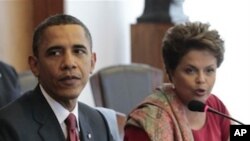U.S. President Barack Obama is in Brazil, the first stop of a five-day Latin America trip aimed at strengthening U.S. economic and political relations with countries in the region. After a meeting with President Dilma Rousseff, Mr. Obama spoke about international action against Libyan leader Moammar Gadhafi.
The president, his wife Michelle, their daughters Sasha and Malia, and other family members arrived in Brasilia, where they received a warm welcome at the airport from Brazilian and U.S. officials.
At the presidential palace, President Rousseff formally welcomed Mr. Obama and his wife as the American and Brazilian national anthems were played.
The two leaders shook hands, and Mr. Obama greeted schoolchildren waving Brazilian and American flags, before going into a bilateral meeting lasting about one hour.
In these remarks translated from Portuguese, the Brazilian leader referred to what she described as the symbolism of the first meeting between Brazil's first female president, and the first African-American president of the United States.
"The peoples of our countries have [built] the largest democracies of the Americas. They also dared to take at the highest level of Afro descent, and of women, demonstrating that the basis of democracy allows to overcome the largest barriers, to build societies that will be more generous and [have] more harmony," she said.
Brazil is now the 7th largest economy in the world, with recent growth exceeding 7 percent. It has increasing trade globally, particularly with China, and within the Latin America region.
President Obama said the U.S. wants to work with a Brazil that has lifted millions of people out of poverty, built a strong democracy and become a global leader. "Brazil is a regional leader promoting greater cooperation across the Americas. And increasingly, Brazil is a global leader, a world leader, going from a recipient of foreign aid to a donor nation, pointing the way to a world without nuclear weapons and being in the forefront of global efforts to confront climate change," he said.
The U.S. and Brazil had their differences under Brazil's former president, Luiz Inacio Lula da Silva, who angered Washington with, among other things, his outreaches to Iran's government.
Relations have been better with President Rousseff. But she made clear that differences remain, mentioning one area of disagreement over measures the U.S has taken to respond to the global financial crisis. "Broad-ranging measures sometimes provoke important changes in the relations of currencies around the world. This process wears [on] good economic practices and pushes countries [to take] protectionism measures and defensive measures of all natures," she said.
Ms. Rousseff said Brazil wants more fairness and balance in trade relations, particularly where Brazilian exports of ethanol, beef, aircraft and other products are concerned. She reiterated Brazil's call for reforms of the United Nations Security Council and international institutions.
Though this trip is aimed, as Mr. Obama has said, at forging new alliances in Latin America, it comes against the backdrop of upheaval in the Middle East and in Libya.
Speaking after the U.S. and allies commenced actions to enforce a no-fly zone over Libya, President Obama said the international community is now determined to act. "Our consensus was strong and our resolve is clear. The people of Libya must be protected and in the absence of an immediate end to the violence against civilians, are coalition is prepared to act, and act with urgency and I am briefing Rousseff on steps we are taking," he said.
The U.S. delegation on this trip includes a number of top U.S. officials, including Treasury Secretary Timothy Geithner and U.S. Trade Representative Ron Kirk.
At his next stop in Brazil, Rio de Janeiro, Mr. Obama will deliver formal remarks to the Brazilian people and visit a shantytown, or "favela" in the city.
The Obamas also will enjoy a bit of tourism, visiting the famous Christ the Redeemer statue in Rio before heading on to Chile, the next stop of this three-country Latin America trip. The president ends his tour in El Salvador.
Obama in Brazil, But Libyan Concerns at Forefront
- By Dan Robinson





